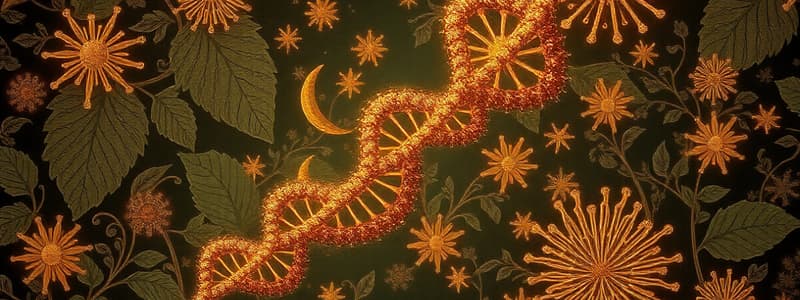Podcast
Questions and Answers
Which of the following best exemplifies the concept of emergent properties?
Which of the following best exemplifies the concept of emergent properties?
- The reduction of a complex ecosystem into its individual species for study.
- The total mass of an organism being the sum of the masses of its individual cells.
- The arrangement of organelles within a eukaryotic cell, allowing for specialized functions. (correct)
- The energy transfer between trophic levels in a food chain within an ecosystem.
An organism is found to produce its own food using sunlight. It also plays a crucial role in breaking down organic matter. How would this organism be classified?
An organism is found to produce its own food using sunlight. It also plays a crucial role in breaking down organic matter. How would this organism be classified?
- An autotrophic producer. (correct)
- A heterotrophic producer.
- A heterotrophic decomposer.
- An autotrophic decomposer.
A scientist observes that the population of rabbits in an ecosystem decreases when the population of foxes increases. The scientist then hypothesizes that foxes prey on rabbits. Which of the following would be the most appropriate next step in the scientific method?
A scientist observes that the population of rabbits in an ecosystem decreases when the population of foxes increases. The scientist then hypothesizes that foxes prey on rabbits. Which of the following would be the most appropriate next step in the scientific method?
- Develop a controlled experiment to test the hypothesis. (correct)
- Conclude that the hypothesis is correct.
- Formulate a theory based on the observation.
- Publish the observation in a scientific journal.
Element X has an atomic number of 16. How many valence electrons does it have?
Element X has an atomic number of 16. How many valence electrons does it have?
Which of the following represents a nonpolar covalent bond?
Which of the following represents a nonpolar covalent bond?
Water has a high specific heat capacity. Which of the following is the most direct consequence of this property?
Water has a high specific heat capacity. Which of the following is the most direct consequence of this property?
Two molecules have the same molecular formula ($C_4H_8$), but differ in the arrangement of their atoms. One molecule has a straight chain, while the other has a branched chain. What type of isomers are these?
Two molecules have the same molecular formula ($C_4H_8$), but differ in the arrangement of their atoms. One molecule has a straight chain, while the other has a branched chain. What type of isomers are these?
A solution has a pH of 3. Compared to a solution with a pH of 6, this solution is:
A solution has a pH of 3. Compared to a solution with a pH of 6, this solution is:
Flashcards
Reductionism
Reductionism
Breaking down complex systems into simpler components to understand them.
Emergent Properties
Emergent Properties
New properties that arise at each step up in the hierarchy of life, from the arrangement and interactions among component parts.
Autotrophs
Autotrophs
Organisms that produce their own food using energy from sunlight or chemicals.
Heterotrophs
Heterotrophs
Signup and view all the flashcards
Hypothesis
Hypothesis
Signup and view all the flashcards
Elements
Elements
Signup and view all the flashcards
Compound
Compound
Signup and view all the flashcards
Isotopes
Isotopes
Signup and view all the flashcards
Study Notes
- The following is a list of topics for BIOL 1406 lecture exams
Evolution, the Themes of Biology, and Scientific Inquiry
- Reductionism's concept, advantages, and disadvantages should be understood
- The concept of emergent properties should be understood
- The levels of the biological organization must be be understood
- The structural components of DNA should be identified
- Distinguish between autotrophs and heterotrophs
- Different types of feedback systems should be understood
- Examples of different types of higher organizational level interactions should be identified
- Correctly format binomial nomenclatures should be known
- The steps of the scientific method must be understood
- Formulate a hypothesis according to specified conditions
The Chemical Context of Life
- Elements and compounds distinguished
- The different components of an atom should be identified
- Understand how to interpret the periodic table and identify each element by its atomic number and mass number
- How isotopes affect an element's atomic mass should be understood
- Potential energy and how it applies to electrons should be understood
- Interpret the potential energy of each electron shell should be understood
- Understand what polar and nonpolar covalent bonds are, and identify examples
Water and Life
- The molecular structure of water molecules including types of charges and bonding should be understood
- The relationship between kinetic energy and motion has to be understood
- The difference between temperature and thermal energy should be understood
- What a solution is and how to identify the different components
- The difference between hydrophilic and hydrophobic substances should be understood
- The molecular mass of different molecules should be calculated
- How different ions affect the pH scale should be understood
Carbon and the Molecular Diversity of Life
- The general purpose of the Miller-Urey Experiment must be understood
- What valence electrons are and how to identify them should be understood
- How carbon chains can vary should be understood
- Hydrocarbons defined
- Isomers defined
- Constitutional (structural) isomers understood
- Cis-diastereomers (geometric isomers) understood
- Enantiomers (optical isomers) understood
The Structure and Function of Large Biological Molecules
- Classification of carbohydrates understood
- The form of carbohydrates the body can use understood
- The different types of fatty acids should be identified
- The organizational levels of protein structure should be understood
- The similarities and differences between DNA and RNA understood
- Predict the counter strand of a given DNA sequence can be done
Studying That Suits You
Use AI to generate personalized quizzes and flashcards to suit your learning preferences.
Related Documents
Description
Explore the core themes of biology, including reductionism, emergent properties, and biological organization levels. Understand DNA structure, autotrophs, heterotrophs, and feedback systems. Learn binomial nomenclature and apply the scientific method, including hypothesis formulation.





